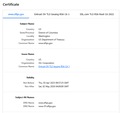
Trying to log into EFTPS and I am getting a message that is not a secure site.
I am getting the below message when trying to log into the EFTPS site. I have never had this issue before.
Did Not Connect: Potential Security Issue
Firefox detected a potential security threat and did not continue to www.eftps.gov because this website requires a secure connection.
What can you do about it?
www.eftps.gov has a security policy called HTTP Strict Transport Security (HSTS), which means that Firefox can only connect to it securely. You can’t add an exception to visit this site.
The issue is most likely with the website, and there is nothing you can do to resolve it.
If you are on a corporate network or using antivirus software, you can reach out to the support teams for assistance. You can also notify the website’s administrator about the problem.
Learn more…
All Replies (8)
Hi, the site is loading normally for me at the moment. Could you check for an "Advanced" button on that error page and let us know the error code (similar to SEC_ERROR_something)?
(Spoiler alert: I'll compare with: Troubleshoot security error codes on secure websites)
SEC_ERROR_UNKNOWN_ISSUER
Thanks. Definitely not the code you want to see when working with a U.S. government site. If you click View Certificate, who is the issuer? I have included screenshots for comparison showing the site certificate, intermediate signing certificate, and root certificate.
Issuer Name: Country: CZ State/Province: Prague Organization: NORTON Organization Unit: Software Department Common Name: Norton untrusted California
Hmm, obviously there is a famous Norton brand of security software, but I don't know whether that is the real Norton or something else intercepting your connection. Seems suspicious.
Could you do a malware check? The following article lists tools other Firefox users have found helpful: Troubleshoot Firefox issues caused by malware.
Also, assuming this is a home network, could you "power cycle" your router (the box that connects to your internet service)? Power-cycle = turn it off, wait 15 seconds, turn it back on. Of course, if anyone else is also using the router, make sure to check with them before booting them off.
That did not work. Thank you.
I assume you mean the router, or did you already complete the malware scans?
In Firefox, can you check these settings:
(1) DNS - increase your protection level: Configure DNS over HTTPS protection levels in Firefox
(2) Disable any proxy server - here's how:
Open the Settings page using either:
- "3-bar" menu button > Settings
- (menu bar) Tools > Settings
- type or paste about:preferences into the address bar and press Enter/Return to load it
In the very tiny search box at the top of the page, type proxy and Firefox should filter to the "Network Settings" section of the page.
Click the Settings button, change the top setting to "No Proxy" and then click the OK button at the bottom of the dialog to save your change.
Any difference?



